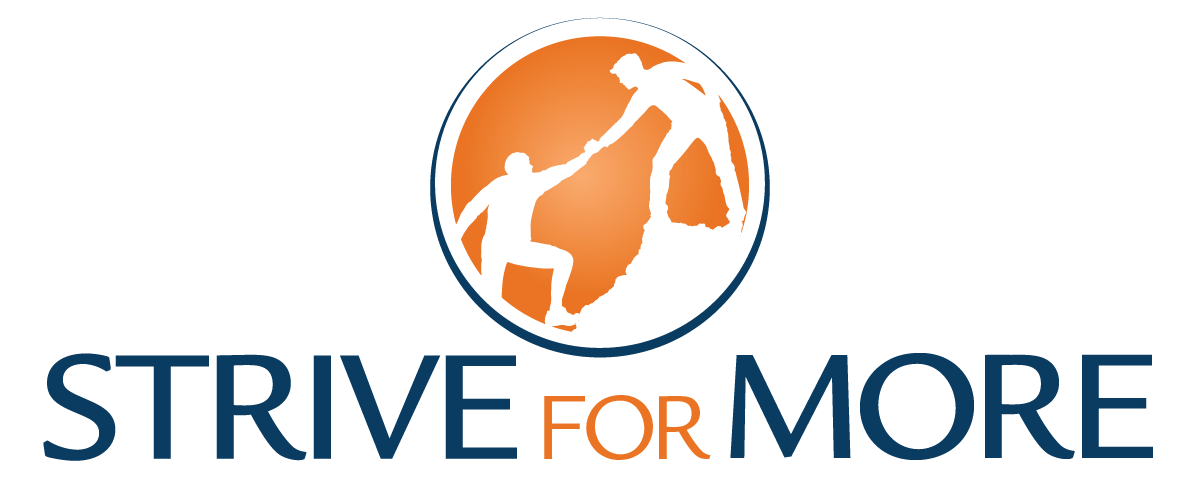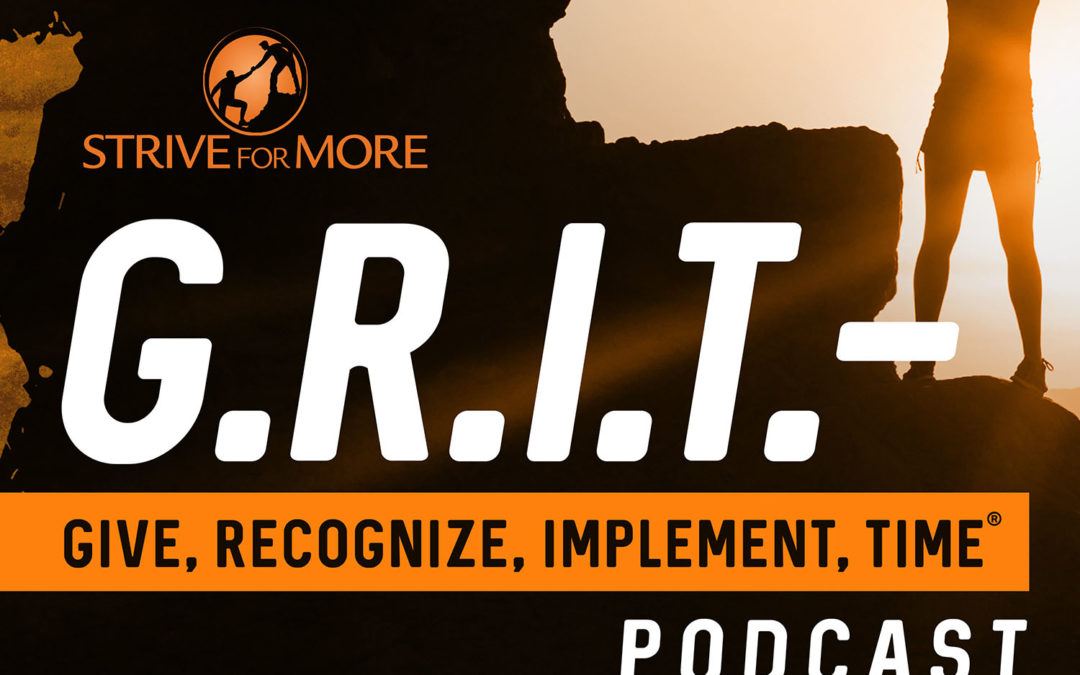Episode Transcript
Hello, everybody. I’m Steve Nathenson, CEO and founder of Strive For More. And today, I want to ask you a question. Have you ever looked at somebody and said, “Man, they’ve got it all together. Why can’t I be like that?” Or looked at somebody and said, “Man, they’re really confident. Why can’t I be that way? I wish I was as confident as they were.” Or even, “Man, it looks like Sharon doesn’t even have a care in the world. I wish I was like that. Could have just let things go and not bug me.” If you’ve ever asked yourself these questions when looking at folks, you’re doing something the rest of us do. It’s called social comparison. It’s a very natural thing for us to do. We look at other people and we make these assumptions and perceptions about them and inherently compare us to them.
However, this can create kind of a deep-seated problem for us. What I mean by that is, oftentimes, it can lead us to detrimental thoughts about ourselves. I’m not confident. I’m never confident. I’m never going to be like them. It’s not going to happen for me. Why can’t I be this way? These thoughts can really create a downward spiral for us. And I’ve used that term before. So I want to explain that real quick. What do I mean by that?
Let’s just say I’m using confidence as an example. And I look at John and I say, “Man, John’s really confident. They’ve got it all together. There’s no issue there at all. They’re able to present the way they present themselves, the way that they hold themselves, what they say. Why can’t I be that way? I’m not that way. I’m not that way because of this, because of that.” This downward spiral is essentially one non-serving thought after another that just keeps us in this cloud of despair. It keeps us sucked downwards and thinking badly about ourselves in that non-serving, and it makes it harder for us to get out of it. And it doesn’t have to be confidence that we’re talking about. It could be anything where one thought leads to another, then another, then another, then another.
A great example of this is actually the internet. There’s so many different things out there right now that draw you in. Clickbait is one of those terms where you see something, you read it, and then you keep clicking and clicking and clicking and keep clicking, and keep going further and further until maybe a half hour has gone by and you’ve wound up somewhere completely different than where you started. That is this concept of this downward spiral. And when we compare ourselves to others, this is the kind of detriment, this non-serving downward spiral that we can get sucked into.
And what happens when this continually occurs and I say something to myself over and over and over again, is I actually start believing it. So the danger and the detriment of social comparison comes into play when I do this constantly. And it’s not just one person. It’s multiple people. And it creates this thought in me that I can’t, I’m not, I never. And it creates a belief that strongly gets solidified every single time that I say this to myself. So when I make this comparison, I can create this detriment and this lack of belief in myself of not being confident, not being, say, carefree, not having it all together, or organized, or prioritizing, or strategy versus, say, tactical. Why can’t I be more strategic?
That’s one of a big struggles for people who are moving up the chain in their organizations is shifting, say, from the tactical to the strategic. In that instance, we may say to ourselves, “I’m never going to be strategic. I can’t see that bigger picture. I’m much better in the day to day. I’m never going to be that way. I’ll never reach that level.” It is a very dangerous path to compare ourselves to others.
So let’s take a step back and let’s not talk about comparison for a second, but let’s talk about us and our uniqueness, because we are all unique and that’s okay. That’s the beauty of it. While it may be great to think about having, say, more than one of us to get what we need to get done, the reality is most of us don’t want to live in a world with people identical to us. Most of us think that we would probably get on our nerves in that scenario, having multiple of us. Do we really want to be in that world where everybody’s the same? The answer really is no. We are all unique and that’s okay. And that’s the beauty of this.
I’m going to bring this back to the comparison here in a second. But I want to share a quote with you that I really love. And it’s a Dr. Seuss quote. And the quote is, “Today you are you, that is truer than true. There is no one alive who is you-er than you.” And the beauty in that simple rhyme is absolutely true that you are you. You are unique. You are who you are meant to be. And that is okay. I don’t need to compare myself to others, because I am me. They are not. And I am capable of being confident. I am capable of being carefree, if that’s what I want. I can embrace who I truly am, give myself the permission to be me, to be human, and walk the path that I want. It is a simple yet powerful quote from Dr. Seuss.
And when we talk about the comparison piece, when we talk about uniqueness, there’s a chance and an opportunity here for us to flip this script. Instead of comparing ourselves to others and seeing the detriment there of I can’t, I never, I won’t, I can’t possibly, that self-defeating self-talk, that downward spiral that can happen can be flipped. So I’ll give you an example from my life. I’m not too shabby of a runner, but there’s definitely people out there faster than I am.
And in fact, last night, I was reading a book, and in that book by a Olympic runner, she was talking about going to the Olympics, competing in her race, and her 5k time essentially boiled down to like a five minute mile pace, five minute, one second mile. Definitely not my pace. And I can look at that and I could say, “Man, why can’t I run like her? I’m never going to be that good. I can’t possibly ever run a 10k at that pace. It’s just never going to happen. I’m never going to be like her.” But the reality is she and I are very uniquely different. I did not grow up running. I did not run cross country in high school. I did not do it in college or join pro teams. I never had that really solidified in me when I was younger. I walked a different path. I didn’t really find running until later in life. So when I look at her and what she’s done, which is truly amazing and incredible, for me, it’s a source of motivation and inspiration.
So instead of comparing myself to her and letting my mind wander how I will never be like her and I will never run that race, or I can’t possibly do this, instead, I look at that and I say, “That is something I can strive for, I can shoot for, I can challenge myself to work as hard as I possibly can to get better. It is a source of opportunity for me to grow and focus on something I can set my sights on as a goal, as a desire, and up-level myself to get there. Versus allowing myself to go down this negative, non-serving self-talk, caught in that downward spiral that creates a belief in me is, I will never run that fast.”
That is the beauty of flipping the script here. So part of giving ourselves permission to be human is accepting that I may naturally compare myself to others, but I can choose how I view and perceive others, and if I let that bring me down, or if I let it serve as a source of inspiration and challenge to strive to be like them, to transcend where I’m at. That choice is always going to be ours to make. So I want to leave you with something actionable from this. Like I said, it’s a very natural thing for us to compare ourselves to others.
So one question I’ll leave you with is whom do you compare yourself to, and what do you compare yourself about? Is it confidence? Is it being carefree? Only you know. But when we create the awareness around that, it becomes easier for us to go through this process of flipping that script, to seeing it as this source of opportunity and this challenge. Now, that question, maybe that doesn’t hit quite home for you. So there’s another way I want to ask that and put this out there for you is, we can actually ask it in a different way through the non-serving, the “negative”.
Before I put that question out there, I want to explain that for a second. It is actually often easier for us in life to talk about what I don’t want, what I don’t like, things I would change or do differently. It is easier for us to describe the negative, the non-serving. So this question can be more easily answered in that fashion. So the flipping of this question to the non-serving, and this is not laced with judgment whatsoever, it’s just a different characterization of it to make it easier to create our awareness. So instead of asking ourselves, “Whom do I compare myself to and about what?” I can ask, “What do I feel inadequate about?” Because that’s, in essence, what we are doing when we compare ourselves. I’m an inadequate runner, I’m inadequate in terms of confidence. I’m inadequate in terms of being carefree or letting things roll off me.
So there’s two different versions of that question we can use to help unearth and create our awareness around what is it that I compare myself to others about and how can I flip that script and use it as this challenge and opportunity to grow. That’s what this self-comparison piece of giving ourselves permission to be human is all about. Embracing and accepting that it’s okay to do this. We all do it. But I’m also in control of how I do it and what I take away from it. So until the next time, if we never ask, we’ll never know. If we never try, we never will. Be the movement in your life.
Listen to all of our episodes here.
Learn More About G.R.I.T. – Give, Recognize, Implement, Time®& Find More Actions You Can Take Right NOW!
To learn more about our signature coaching approach which DOES help people all over the world stay focused, overcome, and achieve, please click here.
Want to Assess Your G.R.I.T. – Give, Recognize, Implement, Time® & get a tangible gauge of key human characteristics that WILL make you successful?
Take our G.R.I.T. – Give, Recognize, Implement, Time assessment now and find out!

